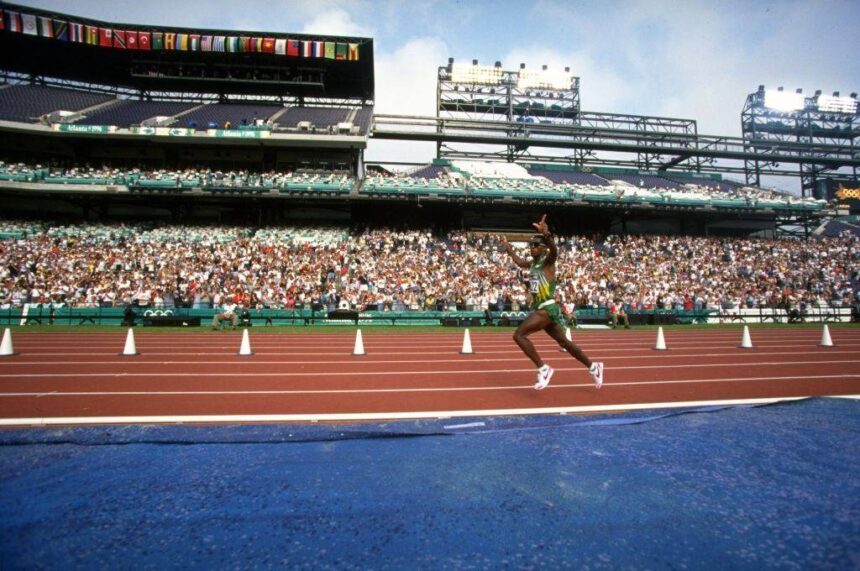The Olympic marathon has a rich history that has evolved over time, reflecting the changing dynamics of the world. From its exclusionary beginnings to its more inclusive present, the marathon has seen many changes and challenges.
Looking back at the first Olympic Games in 1896, it is clear that the event was a far cry from what we see today. Women and slaves were not allowed to participate, and Africa was not represented. However, the 1904 Olympic Games in St Louis saw a significant shift, with South Africa becoming the first African nation to participate in the modern Olympics.
At the 1904 Games, athletes Len Tau, Jan Mashiani, and BW Harris represented South Africa in the marathon race. Despite facing challenges such as high costs and physical obstacles, these athletes made history as the first African participants in the Olympic marathon. Unfortunately, their achievements have been largely forgotten by sport administrators and historians.
The presence of South Africa in the Olympic Games has been marked by colonial ventures and exclusion. From the all-white male team in 1908 to the apartheid era in the 1960s, South Africa’s participation in the Olympics has been fraught with controversy. However, moments of triumph, such as Kennedy Kane McArthur’s gold medal in 1912, have also been part of South Africa’s Olympic history.
The 1904 Games also saw the controversial “Boer War Show,” where indigenous people were showcased as part of the Anthropological Fair. This event, orchestrated by circus entrepreneur Frank Fillis, reflected the eugenic and social Darwinism atmosphere of the time. Participants in the fair, including Tau and Mashiani, were also part of the Olympic tug-of-war competition, highlighting the racial issues of the time.
Despite the challenges and controversies surrounding the 1904 Olympic Games, the marathon race remains a testament to the resilience and determination of athletes like Tau and Mashiani. Their presence at the Games, despite facing physical obstacles and lack of training, is a reminder of the untold stories of colonialism and colonisation.
As we look back on the history of the Olympic marathon, it is important to remember the forgotten athletes who paved the way for future generations. Through detailed research and historical narratives, we can uncover the stories of athletes like Tau and Mashiani and ensure that their legacy lives on in the annals of sport history. The narrative presented here focuses on the experiences and achievements of colonised subjects, specifically Tau and Mashiani, at the 1904 Olympic Games. These athletes, despite their significant contributions, faced marginalisation and discrimination in the colonial context of South Africa.
The narrative challenges the existing historical accounts that downplay the impact of Tau and Mashiani’s achievements on South African athletics. It highlights the pivotal moment in 1904 when the South African governing bodies for athletics and cycling merged, effectively excluding black athletes from participating in competitions. This decision reflected the prevailing colonist ideology of denying the presence and agency of colonised subjects.
Research by Douglas Coghlan reveals that black people in South Africa had already attained a high level of athletic and cycling competition organisation by this time. However, the achievements of Tau and Mashiani were largely ignored or misrepresented by settler writers, who inaccurately portrayed them as Zulus instead of Tswana.
The narrative also touches upon the use of derogatory terms like “kaffir” in official programmes at the 1904 Olympic Games, highlighting the discriminatory attitudes prevalent at the time. The fate of Tau and Mashiani after the Olympics remains uncertain, with reports suggesting they were dismissed from a job for being “civilised.”
In conclusion, the legacy of Tau and Mashiani’s Olympic participation prompts a reflection on the state of sports civilisation in the 21st century. The narrative challenges existing historical narratives and calls for a reevaluation of the contributions and experiences of colonised subjects in the context of colonialism.
Francois Cleophas, an associate professor in sport history at Stellenbosch University, provides a critical perspective on the importance of placing colonised subjects at the centre of research. This new narrative sheds light on the experiences of Tau and Mashiani and their enduring legacy in the history of South African athletics.






